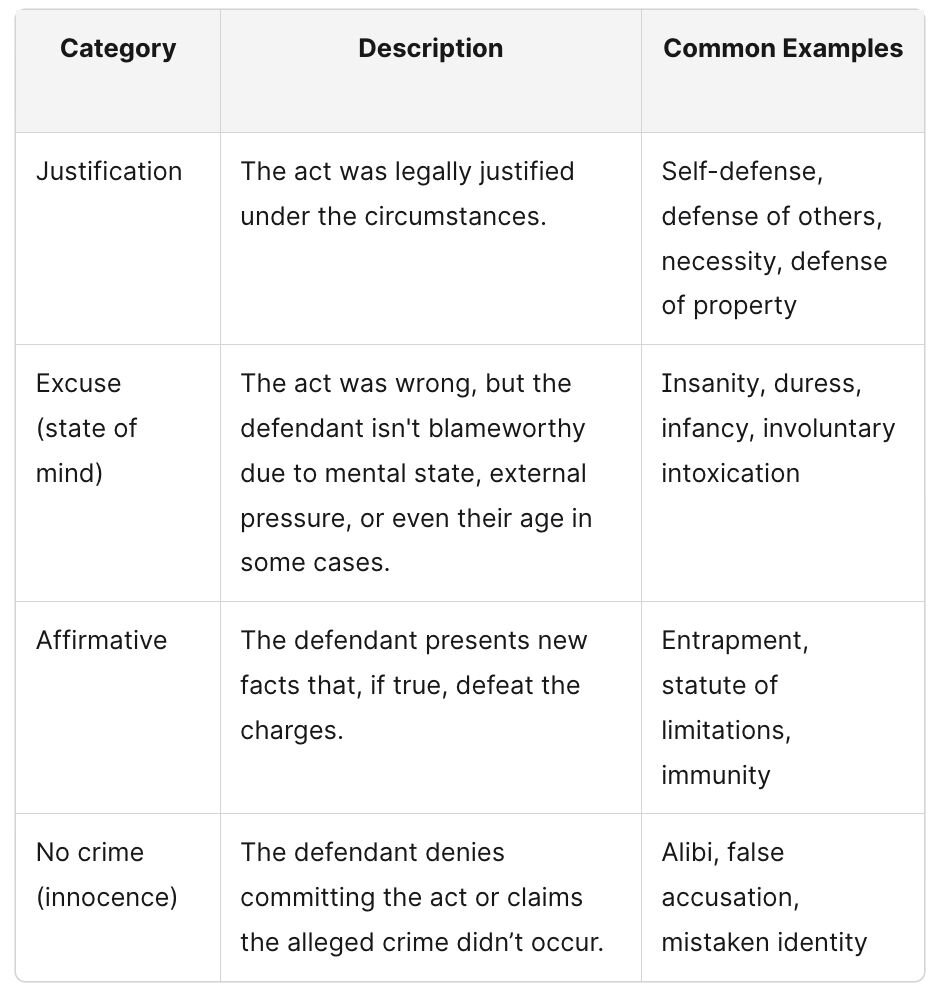Criminal defenses are legal strategies that can reduce or eliminate a defendant's liability for a crime. While some defenses focus on proving innocence, others acknowledge that, even if the act occurred, the defendant shouldn't be held criminally responsible. This might be because they were acting in self-defense, mentally incapable of understanding their actions, or forced to commit a crime under threat of harm, among other reasons.
Whether you're supporting someone through the legal process or seeking information for yourself, let's cover the main types of criminal defenses and how they work in practice.

What are criminal defenses?
A criminal defense is a legal strategy or argument used by a person accused of a crime to challenge the validity of the prosecution's case or to reduce or eliminate criminal liability. These defenses serve as fundamental protections in our justice system, ensuring that individuals have the opportunity to present their side of the story and contest charges against them.
Categories of criminal defenses
There are several criminal defenses, most of which can be categorized into one of four types: justification, excuse, affirmative, and innocence.
| Category | Description | Common Examples |
|---|---|---|
| Justification | The act was legally justified under the circumstances. | Self-defense, defense of others, necessity, defense of property |
|
Excuse
(state of mind)
|
The act was wrong, but the defendant isn't blameworthy due to mental state, external pressure, or even their age in some cases. | Insanity, duress, infancy, involuntary intoxication |
| Affirmative | The defendant presents new facts that, if true, defeat the charges. | Entrapment, statute of limitations, immunity |
|
No crime
(innocence)
|
The defendant denies committing the act or claims the alleged crime didn't occur. | Alibi, false accusation, mistaken identity |

Key types of criminal defenses
The American legal system recognizes numerous specific defenses that fall within the broader categories discussed above. Each defense has unique requirements, applications, and potential outcomes in court, with some examples below. In all cases, it's best to consult a criminal attorney should you find yourself accused of a crime.
Self-defense
Self-defense allows individuals to use reasonable force to protect themselves from imminent physical harm. To successfully claim self-defense, the defendant must typically demonstrate that they:
- Faced an imminent threat of unlawful force
- Had a reasonable belief they were in danger of physical harm
- The force used was proportional to the threat faced
For example, if someone attacks you with their fists, you can defend yourself with similar force, but discharging a firearm would likely be considered excessive unless you reasonably believed your life was in danger.
Many states—such as Arizona, Florida, and Texas—also have "stand your ground" laws that eliminate the duty to retreat before using force, while others require that you try to escape (if safely possible). The key is that your belief of danger and your response must both be reasonable from the perspective of an average person in your situation.
Insanity defense
The insanity defense applies when mental illness prevents a defendant from understanding the nature of their actions or distinguishing right from wrong. Courts typically apply one of several tests to determine insanity, such as the M'Naghten Rule or the irresistible impulse test.
Generally, defendants must prove they suffered from a mental disease or defect that either prevented them from knowing their conduct was wrong or from understanding the nature and quality of their acts.
Expert testimony from psychiatrists or psychologists can also play a crucial role in establishing an insanity defense. These professionals examine the defendant, review medical history, and analyze behavior patterns to determine mental state at the time of the crime. It's also possible that temporary insanity can be a defense if the mental incapacity existed only at the moment of the criminal act.
Successful insanity defenses typically result in commitment to a mental health facility rather than prison.
Duress
Duress occurs when someone commits a crime because another person threatened them with immediate physical harm if they refused. The key elements include:
- An immediate threat of death or serious bodily injury
- A reasonable belief that the threat would be carried out
- No reasonable opportunity to escape the situation
For instance, if someone threatens you with a weapon and forces you to rob a bank, you could claim duress as a defense to the robbery charges.
Necessity
Necessity, while similar, applies when you commit a crime to prevent a greater harm from occurring, even without direct human threats. Classic examples include breaking into a cabin to escape a deadly blizzard or stealing a car to rush someone to the hospital during a medical emergency. Courts weigh whether the harm avoided outweighs the harm caused by the criminal act and whether there were legal alternatives available.
Entrapment
Entrapment happens when law enforcement officers induce someone to commit a crime they wouldn't have otherwise committed. This defense has two key components: government inducement of the crime and the defendant's lack of predisposition to commit it.
Simply providing an opportunity for crime isn't entrapment—for instance, officers can pose as drug buyers or set up sting operations. The line is crossed when they use excessive pressure, threats, or persuasion to overcome someone's reluctance to break the law, ultimately violating their rights.
Intoxication
Intoxication defenses fall into two categories with very different legal implications. Involuntary intoxication occurs when someone is drugged without their knowledge or forced to consume substances against their will. This can be a complete defense to both general and specific intent crimes if the intoxication prevented the defendant from understanding their actions or knowing right from wrong.
Voluntary intoxication—where someone intentionally chooses to drink alcohol or use drugs—is a much more limited defense. It may negate specific intent in crimes requiring premeditation or planning, potentially reducing charges from first-degree murder to manslaughter in a DUI case, for example. However, voluntary intoxication never excuses crimes requiring only general intent, such as assault or battery.
Alibi
An alibi defense proves the defendant was somewhere else when the crime occurred, making it physically impossible for them to be the perpetrator. Strong alibi defenses include credible witness testimony, surveillance footage, credit card records, cell phone location data, or other documentary evidence placing the defendant at a different location.
The defendant typically must provide notice of an alibi defense before trial, including the names of alibi witnesses. This allows prosecutors to investigate the alibi's validity. A solid alibi can result in charges being dropped before trial or lead to a swift acquittal if the case proceeds to court.
Infancy
The infancy defense recognizes that children below certain ages lack the mental capacity to form criminal intent. Parental custody and support for the child can also play a role in these cases. Age thresholds vary by state, but typically children under seven are conclusively presumed incapable of committing crimes. Between ages 7–14, there's a rebuttable presumption of incapacity—prosecutors must prove the child understood the wrongfulness of their actions.
Once minors reach the age of adult criminal responsibility (usually 18), the infancy defense no longer applies. However, youthful offender statutes may still provide reduced sentences or alternative dispositions for young adults. The juvenile justice system handles most cases involving minors, focusing on rehabilitation rather than punishment.
Mistake of fact
Mistake of fact occurs when a defendant's false belief about circumstances negates the mental state required for the crime. For example, taking someone else's identical suitcase from an airport carousel because you genuinely thought it was yours isn't theft because you lacked the intent to steal. The mistake must be honest and reasonable for the defense to succeed.
Public authority immunity
Certain individuals enjoy immunity from prosecution when acting within their official capacity. Police officers using reasonable force during arrests, firefighters breaking into buildings during emergencies, and military personnel following lawful orders all benefit from public authority defenses. The key is that actions must fall within the scope of official duties and comply with relevant laws and regulations.
Statutory defenses
Statutory defenses arise from specific laws providing immunity in certain situations. Good Samaritan laws protect those rendering emergency aid, while some states shield homeowners from liability when defending their property. Diplomatic immunity prevents the prosecution of foreign diplomats, though their home country may waive this protection for serious crimes.
Criminal defenses and burden of proof
In all criminal cases, prosecutors bear the initial burden of proving guilt beyond a reasonable doubt. However, when defendants raise certain defenses, they may assume some burden to present evidence supporting their claims.
For most criminal defenses, defendants need only raise reasonable doubt about their guilt. If claiming a mistake of fact, for example, you typically must produce some evidence showing a mistake occurred, and the burden is on the prosecution to prove there was no mistake of fact.
Affirmative defenses work differently. When claiming insanity, duress, or entrapment, defendants often bear the burden of proving these defenses, often by a preponderance of the evidence—meaning, more likely than not, the defense being claimed is factual and valid. Some states place even higher burdens on defendants for certain defenses.
The outcome of successfully proving a defense varies. For instance, complete defenses like self-defense or alibi may result in acquittal. Partial defenses might reduce charges from murder to manslaughter or from felony to misdemeanor. Excuse defenses such as insanity may lead to commitment rather than imprisonment.
What to do if you need a criminal defense
Finding yourself facing criminal charges can be overwhelming, but taking the right steps immediately can significantly impact your case outcome. Here's what you should do if you or someone you care about needs a criminal defense.
- Seek legal advice immediately: Contact a criminal defense attorney before speaking to police or prosecutors. Even if you believe you're innocent or justified in your actions, anything you say can be used against you. An attorney can protect your rights from the start.
- Gather and preserve evidence: Document everything you remember about the incident while it's fresh. Take photos of any injuries or property damage. Save text messages, emails, or social media posts related to the case. Identify potential witnesses and get their contact information.
- Avoid discussing your case: Don't talk about your case with anyone except your attorney. This includes friends, family, and especially social media. Prosecutors can subpoena witnesses and use your statements against you, even casual conversations.
- Understand your defense options: Work closely with your attorney to explore all possible defenses. Be completely honest about what happened—attorney-client privilege protects these conversations. Your lawyer needs all the facts to build the strongest possible defense.
- Follow your attorney's guidance: Attend all court dates, comply with bail conditions, and follow your lawyer's advice about plea negotiations or trial strategy. Your active participation in your defense can make a significant difference in the outcome.
Criminal defense: FAQs
Do I need a lawyer to use a criminal defense in court?
While you have the right to represent yourself, criminal defense is complex, and the stakes are high. An experienced criminal defense attorney understands local laws, court procedures, and how to present defenses effectively. They can negotiate with prosecutors, file necessary motions, and protect your rights throughout the process. Given that your freedom and future are at risk, professional legal representation is strongly recommended. Keep in mind that you can also request a public defender to represent you if you aren’t able to hire an attorney yourself.
What are the most common criminal defenses?
Some of the most common criminal defenses include self-defense, alibi, lack of intent, and constitutional violations (such as illegal search and seizure). Self-defense applies in many assault and homicide cases, while alibi defenses work for any crime where you can prove you were elsewhere. Lack of intent defenses argue you didn't mean to commit the crime, which can reduce or eliminate charges for specific intent crimes.
What is the difference between a justification and an excuse?
Justification defenses argue that your actions were the right thing to do under the circumstances, such as using force in self-defense. The focus is on the act itself being acceptable given the situation. Excuse defenses acknowledge the act was wrong but argue you shouldn't be held responsible due to personal circumstances like mental illness or duress.
Put simply, justifications say, "I did the right thing," while excuses say, "I'm not to blame."
Can I claim self-defense if I started the fight?
Generally, you cannot claim self-defense if you were the initial aggressor. However, exceptions exist. If you started a minor altercation and the other person escalated to deadly force, you may be able to claim self-defense. Also, if you clearly withdrew from the fight and communicated your intent to stop, but the other person continued attacking, self-defense may apply. Keep in mind that state laws vary significantly on this issue.
How does the insanity defense work?
The insanity defense requires proving that mental illness prevented you from understanding your actions were wrong or from controlling your behavior. You'll need extensive psychiatric evaluation and expert testimony. If successful, you're typically committed to a mental health facility instead of prison. Contrary to popular belief, the insanity defense is rarely used and even more rarely successful—for reference, it applies in less than 1% of felony cases.
What's the burden of proof for an affirmative defense?
For most affirmative defenses, defendants must prove their defense by a preponderance of the evidence—meaning it's more likely than not that the defense applies. This is a lower standard than the prosecution's burden of proving guilt beyond a reasonable doubt. Some states require clear and convincing evidence for certain defenses, like insanity. Your attorney can explain the specific burden for your defense in your jurisdiction.
Is mistake of law a criminal defense?
Mistake of law—not knowing something is illegal—rarely works as a defense because people are presumed to know the law. However, exceptions may exist for crimes requiring specific knowledge of legal status, such as if someone relied on official but incorrect statements of law from government authorities.
Beverly Rice contributed to this article.


